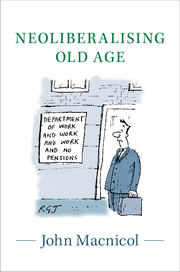4 - Demography as destiny?
Published online by Cambridge University Press: 05 November 2015
Summary
Do we face an impending crisis of old age, brought about by demographic changes? Are these changes so monumental that a fundamental redefinition of retirement is needed? This chapter will examine the demographic drivers that seem to have changed the ageing and social policy agenda, considering in particular the extent to which there really is a ‘crisis’, whether this alleged crisis has arisen only very recently and whether urgent and radical action is justified.
Discourses on ageing and old age have always been permeated by demographic concerns. It is, of course, only right and proper that governments should plan for the future by making projections for likely changes in the size and age composition of future populations in order to anticipate future health, social security and social care costs, plus education and other age-based expenditure. The problem is that such projections are always replete with uncertainties, based as they are on alternative assumptions of future fertility behaviour and likely mortality trends. It is therefore difficult to predict the future: for example, few people in the late 1930s forecast the rise in fertility that was to commence in 1941, just as few in the late 1960s predicted the ‘baby bust’ that was soon to follow. As the Office for National Statistics candidly admitted in 1993, ‘the one certainty of making projections is that, due to the inherent uncertainty of demographic behaviour, they will turn out to be wrong as a forecast of future demographic events or population structure’.
In addition, population projections tend to become politicised, reflecting the vested interests associated with the funding of retirement, health care, housing and so on. They can also symbolise deep-seated fears of ageing, decrepitude and death on a personal and collective level. Many gerontologists maintain that concerns over future ageing populations are deeply irrational – the terms ‘gerontophobia’ and ‘apocalyptic demography’ are often used – deriving from these psychological phobias. They also object to the demographic determinism that maintains that a population with a particular age structure must inevitably possess certain behavioural characteristics – for example, the assumption that the fact that there are in the UK now more pensioners than there are children aged under 16 must have a profound effect on collective behaviour.
- Type
- Chapter
- Information
- Neoliberalising Old Age , pp. 65 - 86Publisher: Cambridge University PressPrint publication year: 2015



